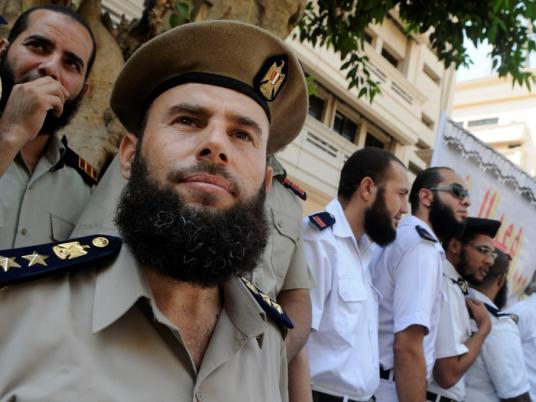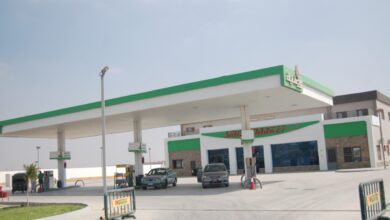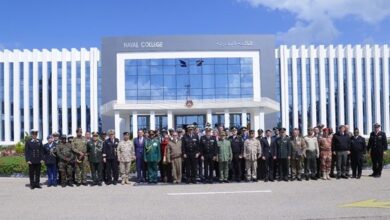
Egypt's interim rulers welcomed on Thursday remarks from the U.S. State Department describing the rule of toppled leader Mohamed Morsy as undemocratic, read in Cairo as a signal that Washington will not cut off its $1.5 billion in annual aid.
In a stark illustration of the desperate state of Egypt's economy, a former minister from Morsy's ousted government said Egypt had less than two months' supply left of imported wheat, revealing a far worse shortage than previously disclosed.
The army's removal of Egypt's first freely elected leader last week, after millions took to the streets to protest against him, has left the Arab world's most populous country polarized by divisions unseen in its modern history.
Violence between supporters of Morsy and soldiers at a military compound this week has deepened the fissures.
Washington has been treading a careful line. U.S. law bars aid to countries where a democratic government is removed in a coup. So far Washington has said it is too early to say whether the Egyptian events meet that description.
Nevertheless, State Department spokeswoman Jen Psaki said on Wednesday Morsy's government "wasn't a democratic rule".
"What I mean is what we've been referencing about the 22 million people who have been out there voicing their views and making clear that democracy is not just about simply winning the vote at the ballot box."
The new U.S. remarks were warmly received by the interim government and swiftly denounced by Morsy's Muslim Brotherhood.
Foreign Ministry spokesman Badr Abdelatty said the comments reflected "understanding and realization about the political developments that Egypt is witnessing in recent days, as embodying the will of the millions of Egyptians who took to the streets".
Brotherhood spokesman Gehad Haddad said the remarks showed American hypocrisy: "There is no way the Egyptian army would have gone through with this coup if it would not have been sanctioned by the U.S."
WHEAT SUPPLIES
Two and a half years of political turmoil has left Egypt on the brink of economic collapse, scaring away tourists and investors, shriveling hard currency reserves and threatening its ability to import food and fuel for its 84 million people.
Speaking to Reuters in a tent at a vigil by thousands of Morsy supporters, the ousted president's supply minister, Bassem Ouda, revealed that government stocks held just 500,000 tonnes of imported wheat.
Egypt, the world's biggest buyer, usually imports about 10 million tonnes of wheat a year, half of which is given out by the state in the form of subsidized bread sold for less than 1 U.S. cent a loaf.
The imported wheat stock figure, previously a closely guarded secret, means Egypt will need to urgently start spending a $12 billion financial aid lifeline it has been given in the past two days by Saudi Arabia, the United Arab Emirates and Kuwait, rich Gulf states that welcomed Morsy's downfall.
Egypt had not bought any imported wheat since February, its longest absence from the market in years, until the eve of Morsy's downfall when it bought 180,000 tonnes.
State grain buying agency GASC said on Thursday it was unlikely to buy any more soon due to the increase in prices and availability of stocks in Egypt.
"I am confident we have enough stocks and hence it is unlikely we buy from the international market soon, especially with the current increase in prices," vice chairman Mamdouh Abdel Fattah told Reuters.
The United Nations Food and Agriculture Organization said in a report that Egypt risked serious food security problems if insecurity and a shortage of foreign currency hindered imports.
"I think the aim of the Arab countries is to make sure Egypt doesn't fail with respect to food security and financial commitments with the international banking system, so I would think they will push to get the aid through quickly," said Kisan Gunjal, economist and food emergency Officer at the FAO.
LEADERS' ARRESTS
The United States and United Nations expressed concern over the arrest and detention of Muslim Brotherhood leaders, including Morsy, who officials say is held at the Republican Guard compound in Cairo, scene of deadly clashes on Monday.
"If politicized arrests and detentions continue, it is hard to see how Egypt will move beyond this crisis," Psaki told a daily briefing on Thursday.
On Wednesday, Egypt's public prosecutor ordered the arrest of Brotherhood leader Mohamed Badie and other senior Islamists, accusing them of inciting violence on Monday when 53 Morsy supporters and four members of the security forces were killed in a dawn clash near the compound.
Morsy's supporters say those killed were peacefully praying when fired upon. The army says terrorists provoked the violence by attacking its troops.
Amid the acrimony, Adly Mansour, the interim president named by the general who removed Morsy, has moved briskly to implement an army "road map" to restore civilian rule.
This week he announced a temporary constitution, plans to amend it and a faster-than-expected schedule for parliamentary elections in about six months.
He also named 76-year-old liberal economist Hazem el-Beblawi as interim prime minister. Beblawi held his first meetings with political leaders on Wednesday and told Reuters that he expected the transitional cabinet to be in place early next week.
Negotiations are difficult, with the authorities trying to attract support from groups that range from secularists to ultra-orthodox Muslims, nearly all of whom expressed deep dissatisfaction with elements of the interim constitution.
Thousands of Brotherhood supporters have maintained a round-the-clock vigil near a mosque in northeast Cairo demanding Morsy be reinstated, an aim that now seems in vain.
The start of the Ramadan Muslim fasting month has done little to dampen the Brotherhood protest. Supporters are sheltering in tents from the summer heat during daylight hours when they are forbidden to eat or drink, and coming out in greater numbers in the evening.
They called for more protest marches on Friday, the Muslim prayer day, while the anti-Morsy Tamarod group invited supporters to celebrate Ramadan in Tahrir Square.
Fighting between the sides killed 35 people last Friday, but Cairo and other cities have been calmer since Monday's clash.
The Tamarod youth movement that led the huge protests against Morsy was one of the liberal groups to sign a statement issued on Thursday urging both sides to remain peaceful.
Both sides in Egypt have become more anti-American in recent weeks. Morsy's opponents say President Barack Obama's administration supported the Muslim Brotherhood in power, while Morsy's supporters believe Washington was behind the plot to unseat him.
"Obama supports democracy, but only if it goes to those who aren't Islamists," heavily bearded Morsy supporter El-Sayyed Abdel Rabennabi said at the Brotherhood vigil.
On Tahrir Square, where Morsy's opponents gather, the animosity is no less fierce.
"The Brotherhood are fighting us in the streets, fighting to take back power, and America is sitting on the fence," said aircraft mechanic Tawfiq Munir.




